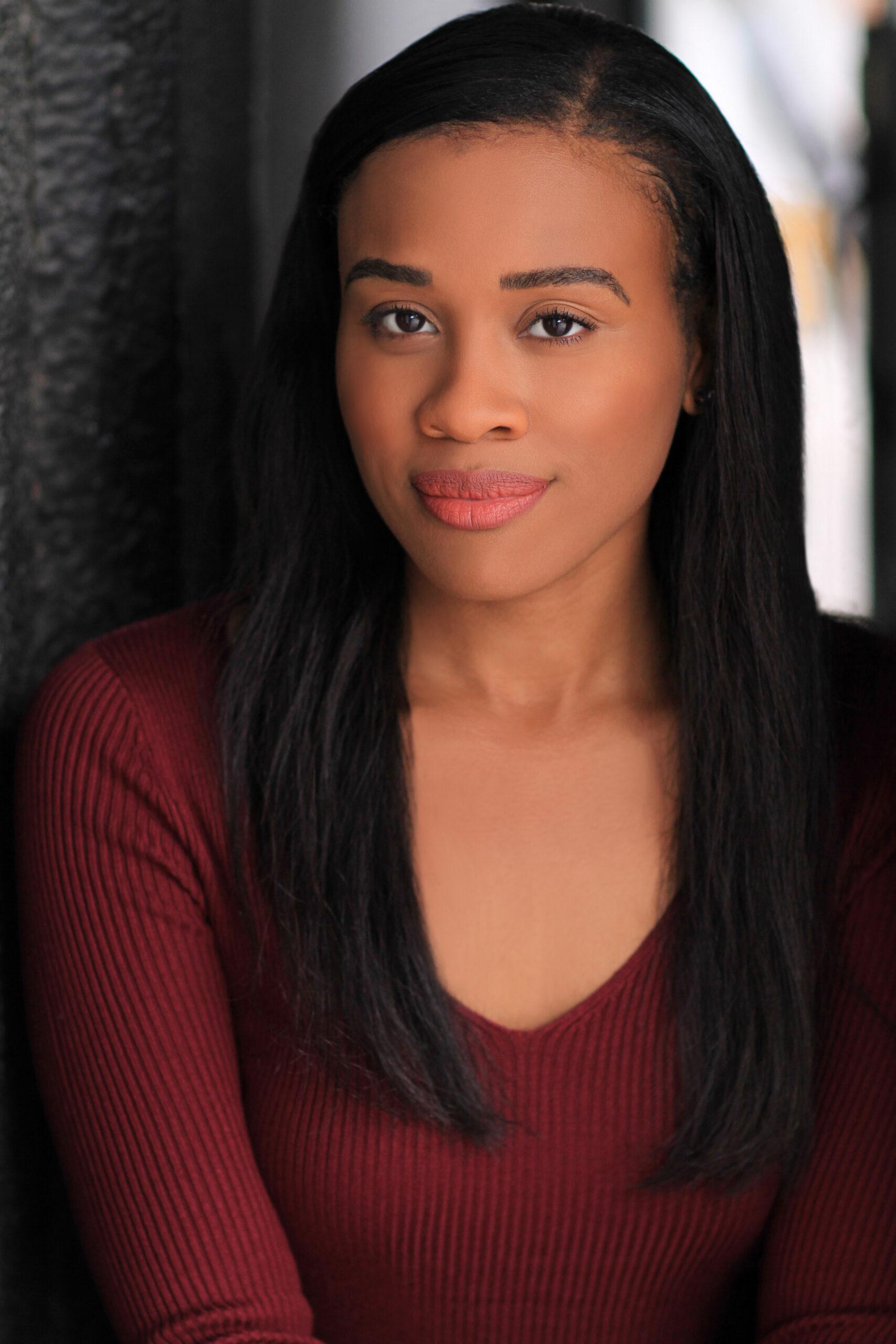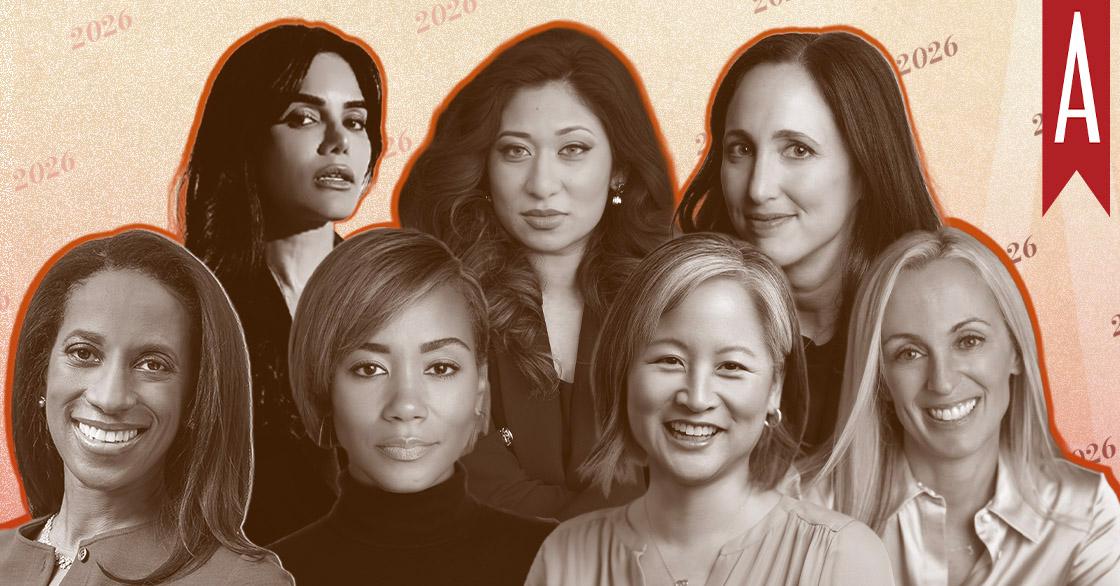Jill Spiegel is a powerhouse in the world of golf. As President of PGA Tour Superstore, she’s led the company through a wild (and wildly impressive) transformation. When she joined in 2011, there were only 11 stores. As of June 15th, we just opened store number 77. That kind of growth doesn’t happen without a leader who knows how to lead with vision, strategy, and passion.
Jill didn’t even consider herself a golfer for most of her life. She grew up in a golf family but was more into swimming and running. After a 30-year break from the game, she came back in a big way, seeing not just the business opportunity, but also the joy the sport brings to people of all ages and backgrounds.
Under her leadership, PGA Tour Superstore didn’t just expand but evolved into what we see today. She’s overseen major growth and helped turn what was once a struggling business into a go-to destination for pros, beginners, and families alike.
When it comes to timing, Jill was right on time and stepped up as golf was shifting and becoming more inclusive, younger, more reflective of the world around us. She’s leaned into that change, making sure the PGA Tour Superstore feels accessible and welcoming to everyone, while still delivering top-tier service that makes people want to come back. Jill didn’t just grow a business, but she helped reshape what golf looks like for a new generation.
Her Agenda:You’ve been with PGA Tour Superstore for over a decade, and now, as the president, you’re leading during a massive moment of growth with lots of different things happening. What do you think, over your time, I’m sure there are so many, but maybe just a few call-outs of one of the most meaningful parts of the journey for you?
Jill Spiegel: I just celebrated my 14-year anniversary. When I started in 2011, we had 11 brick-and-mortar stores. And this past weekend, we just opened store number 77. So we’ve had extraordinary growth, and not only have we had growth through opening new stores, but we’ve seen a lot of same-store growth as well. So even if we weren’t opening new stores, we’re growing our existing stores.
You know, to see this company grow almost 10 times from what it was when I started has been really rewarding. When I first started, the company was struggling, doing a lot of sales, but you know, struggling bottom line, and we’ve completely turned that around. So we’ve not only seen top-line growth, but we’ve seen bottom-line growth as well. It’s just been a great journey.
When I started, we had less than 40 people in our store support center. And today we have 200. Even though the company had been around, started in 2004 for about a decade before I started, it was almost like working for a startup, and there was so much opportunity, and to see that come to fruition has been tremendous.
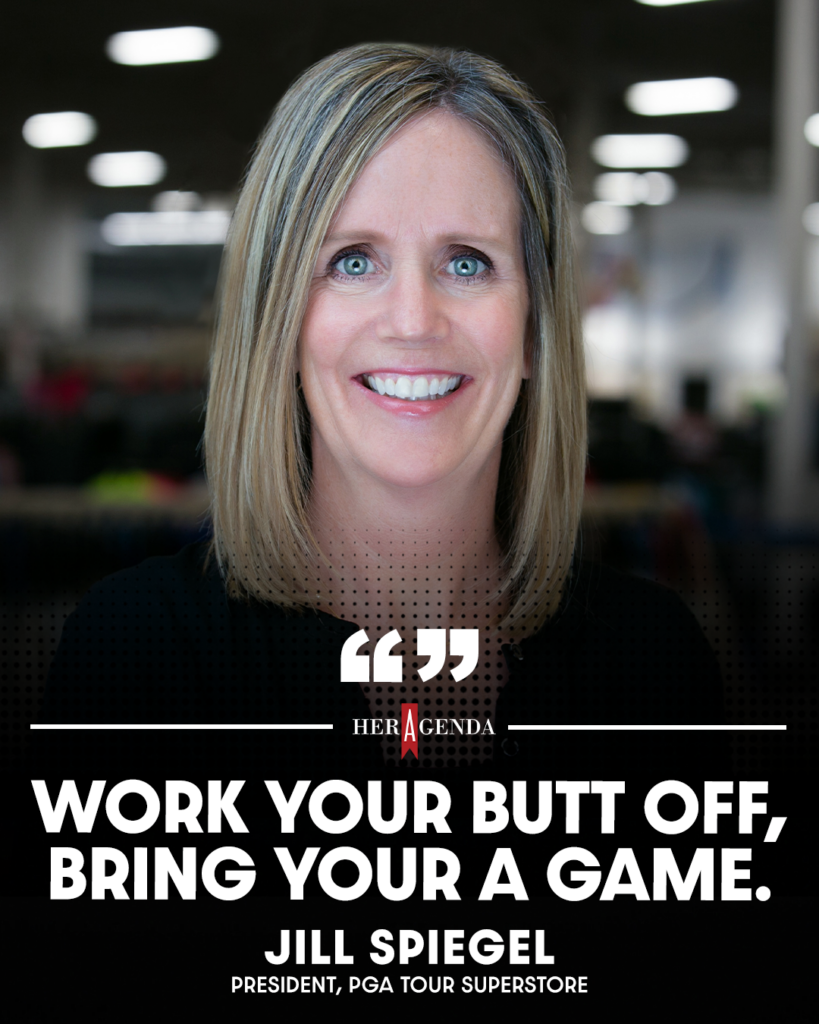
Her Agenda:How do you balance scaling the business while staying so rooted in the community and the experience of the stores?
Jill Spiegel: That’s a good question. And we have a very robust e-commerce business as well. [It] really grew during COVID because we had to close our stores for a couple of months. So that gave us some momentum we didn’t have prior to COVID.
But even though we’re growing that channel, we don’t want to grow it for the sake of our brick-and-mortar business because that’s really our secret sauce. That’s what differentiates us. We have big stores and really vast assortments, but most importantly, we pride ourselves on the quality of our store associates, and that’s really our key differentiator.
Anybody can build big, beautiful stores. Anybody can buy a product, but our service levels are extraordinary. And that’s part of the beauty of our business is the experience that you have when you come in. It’s really about the relationships that we have with our customers. Not so much the transactions, I mean, those will naturally come. So that’s really how we’ve stayed true to our model, and grown at the same time.
Her Agenda:Which I think is so exciting because golf has changed dramatically over the last few years. We’re seeing more young people golfing, we’re seeing more women, more people of color embracing the game, which I think is so exciting. Do you have any idea of what exactly is driving this cultural shift right now?
Jill Spiegel: You’ve done your research. [Golf is] a very male-dominated sport. Golf is typically, we jokingly say, it’s a middle-aged white man’s sport, [and] it was for decades. The largest age segment right now is 18 to 34-year-olds and young adults, and 60% of all new golfers are women. Women now represent close to 30% of all golfers. It was in the high teens, not that long ago. [With] people of color, there’s been a tremendous amount of growth there too. So it’s really fun to see what used to be kind of a stodgy old person’s sport, [has] become really young [and] hip.
It’s got a cultural shift happening as well. I’m a little bit closer to it, but even people who aren’t playing golf are watching it, or they’re following it on social media, or they’re going to venues like Topgolf, they’re betting on it. So there’s just, there’s a cool factor to a sport that had zero cool factor not too long ago.
It’s been fun to see. We’re leaning into a lot of those trends. Golf can be very intimidating. You come into our stores sometimes, if you’re a new golfer, you’re like, ‘Oh, I don’t really even know where to start.’ We’re leaning into that emerging customer base. How do we do our part? How do we make new golfers feel welcome? How do we retain new golfers? Every sport has that issue. You have so many people coming in, but a lot of people leave. How do you keep all those new people coming in, and how do you make it welcoming for everybody? Because we naturally get the avid golfer in our stores, they know what they’re doing. We want to be more inclusive. We want to welcome the newer golfer.
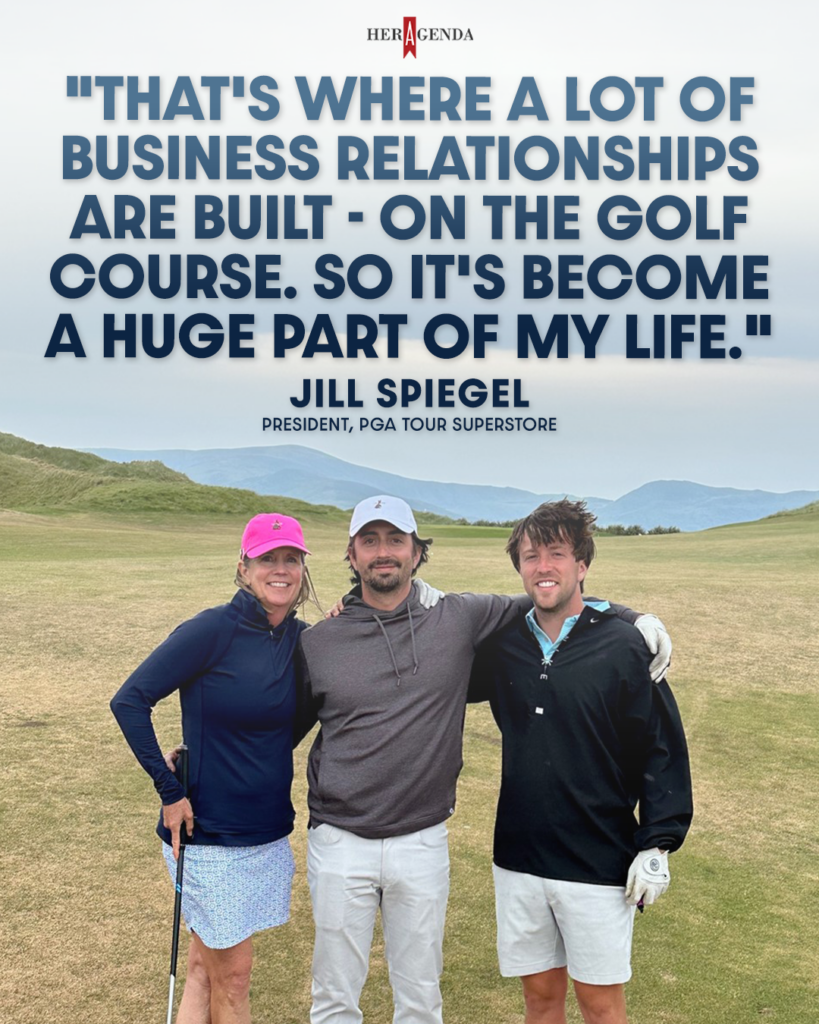
Her Agenda:I love that. And correct me if I’m wrong. Did you grow up in a golfing family?
Jill Spiegel: I did. I was a swimmer and a runner; I had no interest in golf, but my parents were big golfers. When I was a teenager, my mom suggested, kind of pushed me a little bit. She said, I think you should at least learn it because I think when you’re an adult, you may like it.
Then I started a family and a career and [because of that] golf [had to] go on the sidelines for a while. I didn’t play for a good 30 years. Then, my kids were a bit older, I joined this company, and I naturally had more opportunities to play.
It was important that I learned how to play because I’m dealing with a lot of manufacturers, and you do want to be able to play. That’s where a lot of business relationships are built on the golf course. So it’s become a huge part of my life.
My husband is now playing [golf,] and he hasn’t been playing for long—just a handful of years. Now both my kids are playing, too. So it’s very much a part of our DNA. It’s very much a part of our family how we spend our free time. We’re all in on golf.
Her Agenda: I love that. I was going to say that too. I feel like a lot of families now are even golfing together and getting their kids into golf, which I think is fun. And even with where golf is at right now, what would you say are the biggest opportunities to create more long-term access and inclusion for people who are interested in the sport, but maybe still feel a little intimidated?
Jill Spiegel: Yeah, it’s a good question. I think accessibility can be hard, but now, when you look at it, there’s 28 million people who play golf on a golf course every year, but there are 45 million people who play golf. You’re saying, okay, well, what does that mean? So they’re either going to Topgolf or they’re hitting into a simulator. That didn’t use to mean anything, but now 10% of those people who, if that’s their first exposure, they’re taking up the game.
I always encourage people to go to their local driving range and stick with it. Studies find that if you have a good first experience, you’re welcome. If you’ve had some kind of formal instruction, you’ll stay with it. So that’s a really important piece of it because people—a lot of people—are coming into it, but they’re leaving as well.
75% of the courses in the country aren’t all a private club game. Golf can have that reputation. There are a lot of private clubs, but 75% of the golf courses in the country are public. So it is accessible. People forget that because golf has this stigma, that it’s a wealthy person’s sport. It’s not. You don’t have to go out and play 18 holes. I made the comment that I walked away for 30 years because of the time, the expense, and accessibility, but I encourage people to go, go to a par three course, and go play for an hour and a half.
People who are new to the game often assume that good golfers don’t want to play with them, which is a big misconception.
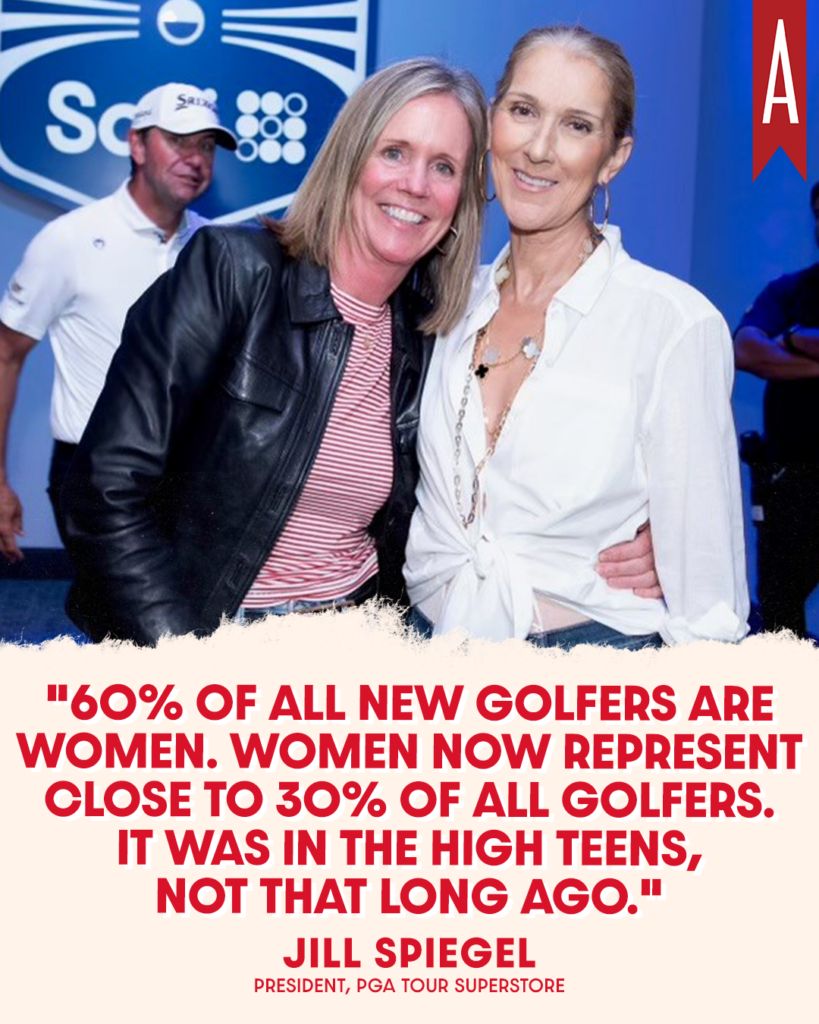
Her Agenda:I want to get back to your work and everything that you’ve been able to accomplish as well. What would you say is one piece of advice that you give to a young woman looking to lead in industries where they may still feel like the only one in the room?
Jill Spiegel: I was the only woman on the leadership team when I started. That’s not the case anymore. I’m proud to say that close to half of our store support center is female now. It can be intimidating. I would say, have confidence in why you were hired and lean into that. I was hired for a reason. I wasn’t hired for my golf skills. I was hired because I had a solid career background. I worked in [retail] stores for 24 years.
So have confidence in why you were hired, because you were hired for a reason. [Women have a different point of view], and women and men are different. Diversity of thought is important. It rounds out the group. Seek out mentors, formal, informal, whatever it might be. Not just women. If there are women, that’s great. But seek out men, too. I’ve never felt once, even though I was in the minority from that standpoint, I never once felt like, oh my gosh, I’m, I’m a woman in a man’s world. I shouldn’t say not once, but I always felt welcome.
Her Agenda:This may be a little bit of a weird question because I know it varies from store to store, but do you have a favorite, go-to spot in the store where it always makes you smile? You’re like, oh, I really like that display we’ve got up there, or anything like that.
Jill Spiegel: Women’s apparel. I’m a golfer and I love apparel.
What I love about our stores is you walk in, there’s just [so much] activity. My favorite part is not a specific area. It’s the sound, the feel that when I walk into the store, [the sounds that] I hear, I love hearing people hitting. They might be just practicing in the back, or they’re being fit for equipment, or it’s our associates up in the front services, gripping clubs, saying hello to you.
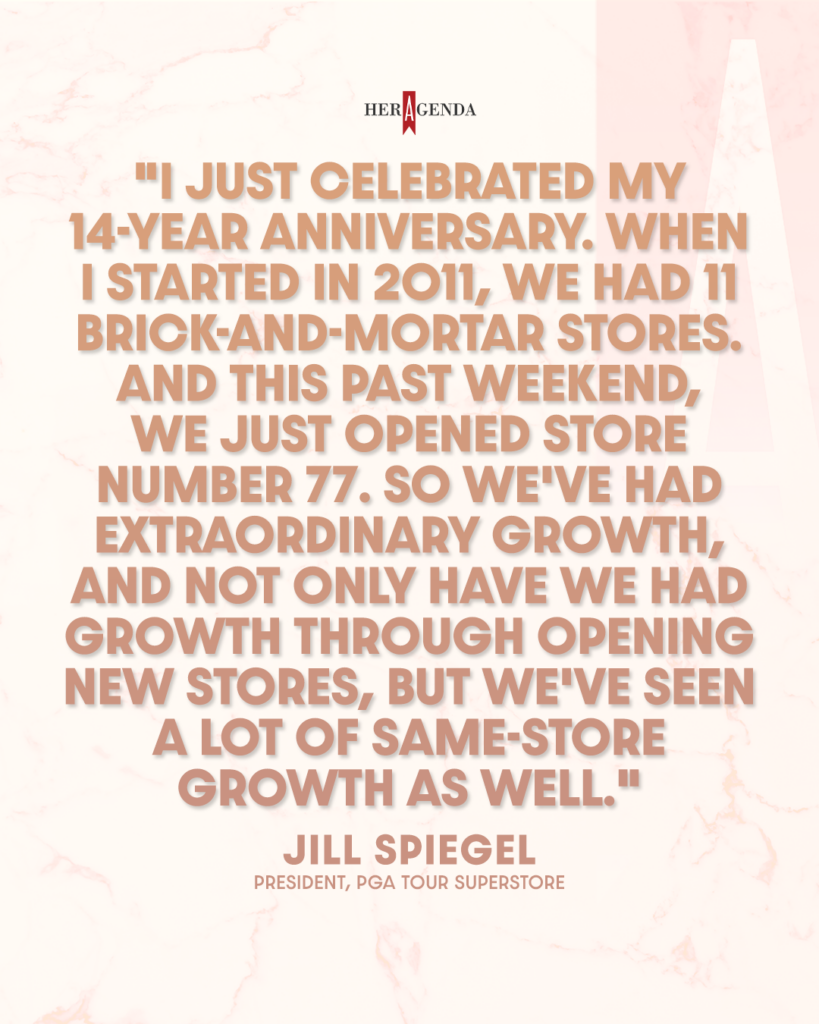
Her Agenda:That’s a good answer. Do you have a go-to song or anything that you like to listen to when you’re golfing or even before a big meeting?
Jill Spiegel: Yeah, I have a bunch of very weird, eclectic tastes in music, but no, I actually don’t like to listen to music on [the] golf course. A lot of people do. That’s part of the beauty of this evolution of golf is that you hear music now. It’s more casual. So if people want to listen to music, it’s fine. I just like the peace and the quiet of nature outside. But I’d have to say Dancing Queen. That’s a good one. I have many I could list, but that’s one of them.
Her Agenda:If you could play 18 holes with any three people, dead or alive, who would you pick?
Jill Spiegel: Well, my mom for sure. I would say I’d want to play with one of the greats like Arnold Palmer. I’m going to put Arnold Palmer out there. And Condoleezza Rice. She was one of the first female members to be accepted into Augusta National. I have such respect for her and for what she’s done. She happens to be a good golfer and very, very passionate about golf. Oh, the other one I used to say, but I have already named [three] was Nelson Mandela too. I don’t know if he’s a golfer or not.
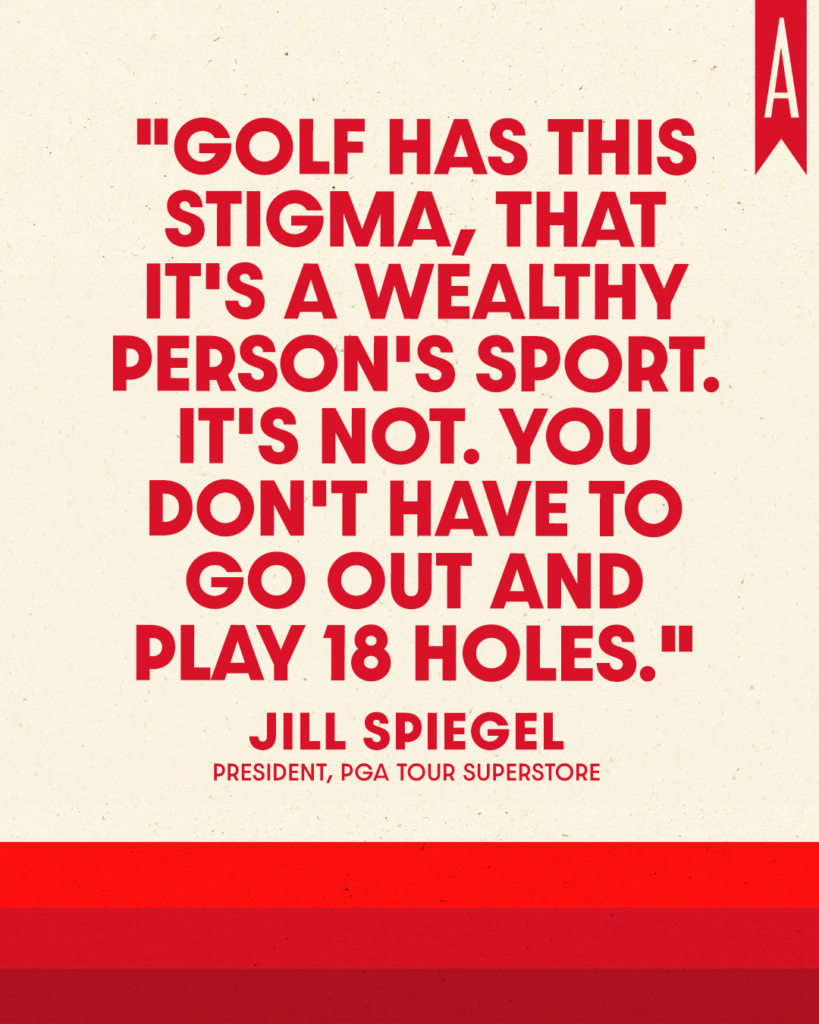
Her Agenda: What would you say to women who want to start playing golf? If they’re still unsure, they’re curious about it and what the benefits could be for joining in on the game.
Jill Spiegel: Find a friend who is interested in playing, or find a friend who already plays and have them help you. I actually think that’s better because [they] can explain the nuances of the game [and] some of the rules that can be so super overwhelming. I would say just stick with it. Because it’s hard. It’s this little ball. A lot of times, you’re going to hit it, whiff it, [but] stick with it because it’s fun. And once you start hitting a good shot here and there, you’re like, wow.
And there are so many benefits [to playing golf]. First of all, you’re outside, you’re getting exercise. And there are so many great social aspects to it. If you’re a working woman, it’s great; a lot of business conversations happen on the golf course. And it’s good for overall confidence as well. So it’s great in so many aspects.
Her Agenda: Do you have a saying or a mantra that you live by?
Jill Spiegel: I don’t have a saying or a mantra. But I would say for me, it’s bring your best every day. That’s not my mantra, but, you know, it’s work your butt off, bring your A game. Bring your best, and it sounds silly, but I think it’s important.
Her Agenda: And then last question, this one may be a little tough, but in a few words or one word, what would you describe the future of golf?Jill Spiegel: Bright. Yeah. That can be negative. I would just say bright. I think, you know, you look at COVID and you look at so many industries, fishing, boating, golf, hiking, that just ramped up so quickly, but a lot of them came right back down. Golf has sustained that growth, which is pretty remarkable. The industry tracks rounds of golf every year, and five straight years have been record years. People are playing at record levels.
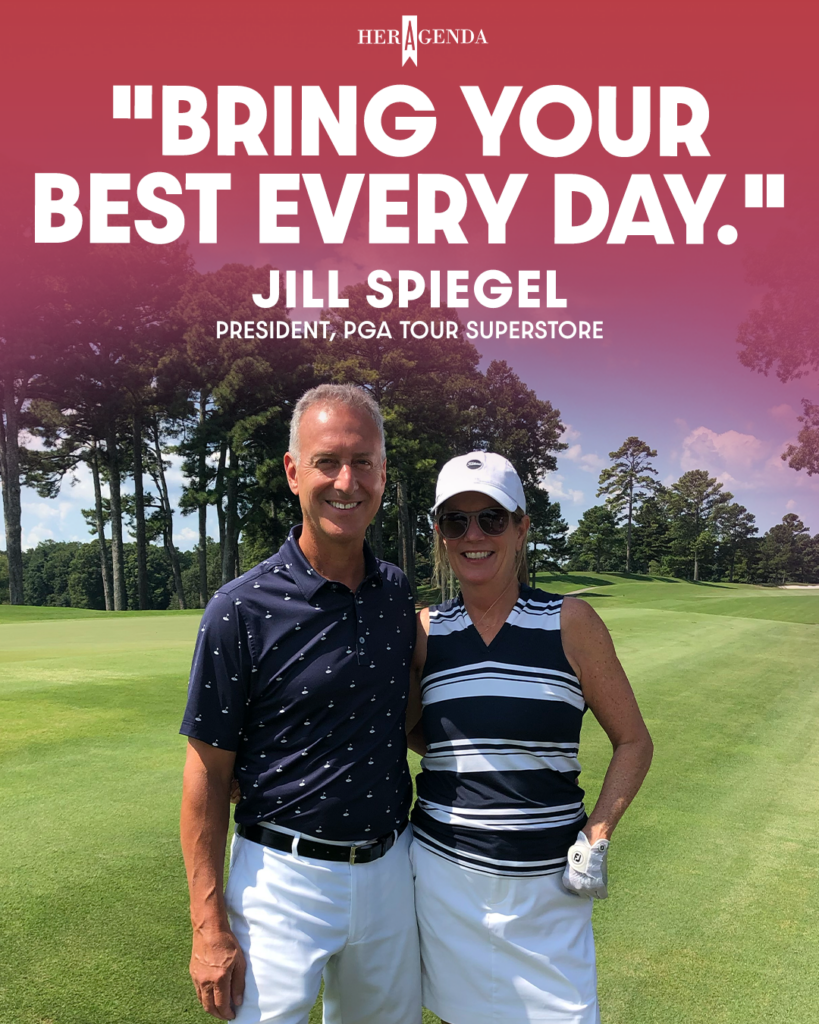
[Editor’s note: This interview has been edited for length and clarity.]



